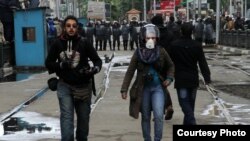ALEXANDRIA, EGYPT —
Taking photographs in Egypt attracts hostility from all sides of the political crisis that has turned increasingly violent in recent weeks, and many photographers in the tense city of Alexandria avoid the streets, or the city altogether.
In better times, tourists from all over Egypt and the world visited Alexandria to take pictures of the blue waters, the historic buildings and the world-famous library. But in these turbulent days, cameras are snatched from the few tourists in the city and residents taking pictures from their balconies are threatened.
In better times, tourists from all over Egypt and the world visited Alexandria to take pictures of the blue waters, the historic buildings and the world-famous library. But in these turbulent days, cameras are snatched from the few tourists in the city and residents taking pictures from their balconies are threatened.
Despite the dangers, photojournalist Amira Mortada has been taking pictures on the streets for more than three years. In recent weeks, she has been harassed, shot at and chased, But she has no desire to quit.
Mortada said when she started taking pictures for the news she was the only female photojournalist in town. Since then, two other women have entered the field.
She said after the Hosni Mubarak regime fell in 2011, the onslaught of free speech made her feel like she could fly. But two and a half years later, photography is more dangerous than ever as supporters of the Muslim Brotherhood face off with army supporters.
The Egyptian military ousted President Mohamed Morsi July 3 and since then the Muslim Brotherhood has organized near-constant protests. More than a thousand people have died in recent weeks as the military-installed interim government cracked down on demonstrations.
Protests continue on a smaller scale and journalists are caught in the middle as news sources line up on both sides. Several journalists are among the dead. Some local reporters are accused of being pro-government while foreign reporters are accused of being pro-Brotherhood.
At a café in central Alexandria, near the scene of many recent clashes, Mortada’s colleague, photojournalist Ahmed Tarek, said no matter where you attempt to take pictures in Alexandria, someone will be suspicious.
“In the end of the day they judge journalists from the chief editor’s point of view," he said. "A colleague of ours -- many colleagues faced violence and harassment when they work because of the point of view of their chief editor. Not them.”
Mortada said her newspaper has taken a side in the political crisis but she personally has not. Photography, she added, can be used to support propaganda for one side or another. But photos can also tell the truth when placed next to words that do not, she noted.













